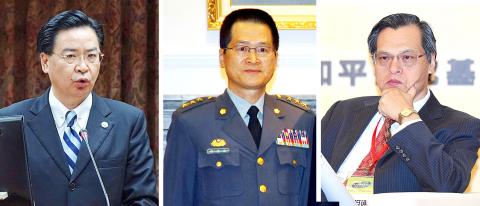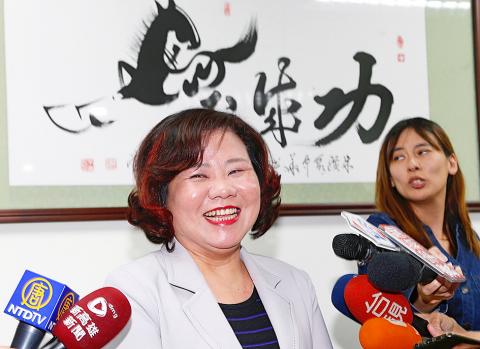President Tsai Ing-wen’s (蔡英文) administration yesterday announced a reshuffle of its top national security, foreign affairs and cross-strait officials.
Presidential Office Secretary-General Joseph Wu (吳釗燮) is to replace Minister of Foreign Affairs David Lee (李大維), who is to fill a vacancy left by National Security Council Secretary-General Yan Te-fa (嚴德發) after Yan becomes the minister of national defense.
Mainland Affairs Council (MAC) Minister Katharine Chang (張小月) is to be replaced by Chen Min-tong (陳明通), a professor at National Taiwan University’s Graduate Institute of National Development who headed the council from 2007 to 2008.

Photos: Taipei Times and CNA
Due to health issues, Minister of Labor Lin Mei-chu (林美珠) is to leave her post and be succeeded by Kaohsiung Deputy Mayor Hsu Ming-chun (許銘春), while former chief of the general staff Chiu Kuo-cheng (邱國正) is to take over the Veterans Affairs Council after Director Lee Shying-jow (李翔宙) departs.
Chang, Lee Shying-jow and Minister of National Defense Feng Shih-kuan (馮世寬) are to be appointed to new posts, Executive Yuan spokesman Hsu Kuo-yung (徐國勇) said, without providing further details.
However, media reports said that Feng is to assume the presidency of a government-funded national security think tank, which is expected to become operational in May.

Photo: CNA
The personnel changes are scheduled to take effect on Monday, with the exception of Chen, who has to handle school matters first and would not report for duty until the middle of next month, Hsu Kuo-yung said
MAC Deputy Minister Lin Cheng-yi (林正義) is to step in for Chen in the meantime, he added.
Regarding Wu’s successor, Presidential Office spokesman Alex Huang (黃重諺) downplayed speculation that it would be Kaohsiung Mayor Chen Chu (陳菊), saying only that the matter has yet to be determined and would be announced as soon as a decision is made.
Given that the reshuffle mostly pertained to the president’s mandates on foreign affairs, national defense and cross-strait ties, the lineup was not finalized until a meeting between Tsai and Premier William Lai (賴清德) at 1:30pm yesterday, Huang said.
As some ministers who would reportedly be replaced were not included in the reorganization, such as Minister of Education Pan Wen-chung (潘文忠) and Minister of the Interior Yeh Jiunn-rong (葉俊榮), there was speculation in the media over whether another reshuffle could occur after May 20, the second anniversary of Tsai’s inauguration.
There were no leadership changes in government agencies overseen by Lai — other than Lin Mei-chu — because of good teamwork between the premier and those Cabinet members, Hsu Kuo-yung said.
“The premier also felt that his team’s momentum has not only not slackened since he assumed the premiership on Sept. 8 last year, but has continued in an upward direction,” Hsu Kuo-yung said, adding that any speculation of a reshuffle was unfair to the hardworking ministers.
Nevertheless, he declined to personally guarantee the other ministers’ jobs would be safe when asked, saying that politically appointed officials should always be prepared to leave.
In response to a reporter’s question on whether Wu’s appointment as foreign minister constituted a demotion, he said that Wu’s current and future posts are all minister-level positions.
Wu, a long-time trusted aide of Tsai on international and security affairs, served as the nation’s representative to the US, as well as Democratic Progressive Party secretary-general under Tsai’s party leadership from May 2014 to May 2016, when she campaigned for the presidency.
Following Tsai’s inauguration as president, Wu was put in charge of the top national security body before being transferred to his current post in May last year.

CHAOS: Iranians took to the streets playing celebratory music after reports of Khamenei’s death on Saturday, while mourners also gathered in Tehran yesterday Iranian Supreme Leader Ayatollah Ali Khamenei was killed in a major attack on Iran launched by Israel and the US, throwing the future of the Islamic republic into doubt and raising the risk of regional instability. Iranian state television and the state-run IRNA news agency announced the 86-year-old’s death early yesterday. US President Donald Trump said it gave Iranians their “greatest chance” to “take back” their country. The announcements came after a joint US and Israeli aerial bombardment that targeted Iranian military and governmental sites. Trump said the “heavy and pinpoint bombing” would continue through the week or as long

TRUST: The KMT said it respected the US’ timing and considerations, and hoped it would continue to honor its commitments to helping Taiwan bolster its defenses and deterrence US President Donald Trump is delaying a multibillion-dollar arms sale to Taiwan to ensure his visit to Beijing is successful, a New York Times report said. The weapons sales package has stalled in the US Department of State, the report said, citing US officials it did not identify. The White House has told agencies not to push forward ahead of Trump’s meeting with Chinese President Xi Jinping (習近平), it said. The two last month held a phone call to discuss trade and geopolitical flashpoints ahead of the summit. Xi raised the Taiwan issue and urged the US to handle arms sales to

State-run CPC Corp, Taiwan (CPC, 台灣中油) yesterday said that it had confirmed on Saturday night with its liquefied natural gas (LNG) and crude oil suppliers that shipments are proceeding as scheduled and that domestic supplies remain unaffected. The CPC yesterday announced the gasoline and diesel prices will rise by NT$0.2 and NT$0.4 per liter, respectively, starting Monday, citing Middle East tensions and blizzards in the eastern United States. CPC also iterated it has been reducing the proportion of crude oil imports from the Middle East and diversifying its supply sources in the past few years in response to geopolitical risks, expanding

Pro-democracy media tycoon Jimmy Lai’s (黎智英) fraud conviction and prison sentence were yesterday overturned by a Hong Kong court, in a surprise legal decision that comes soon after Lai was jailed for 20 years on a separate national security charge. Judges Jeremy Poon (潘兆初), Anthea Pang (彭寶琴) and Derek Pang (彭偉昌) said in the judgement that they allowed the appeal from Lai, and another defendant in the case, to proceed, as a lower court judge had “erred.” “The Court of Appeal gave them leave to appeal against their conviction, allowed their appeals, quashed the convictions and set aside the sentences,” the judges